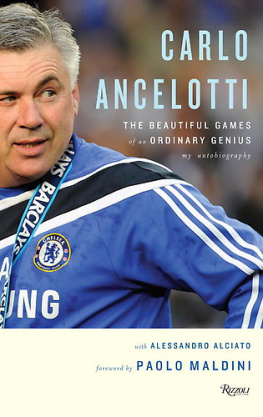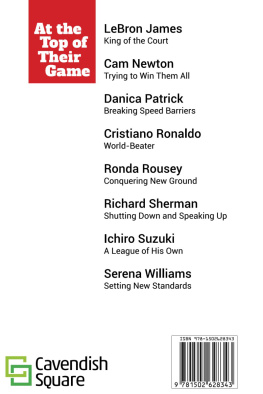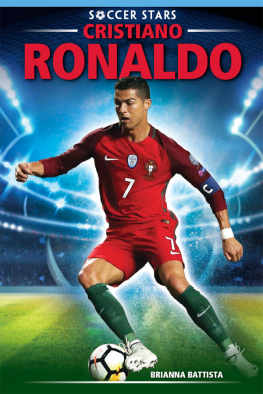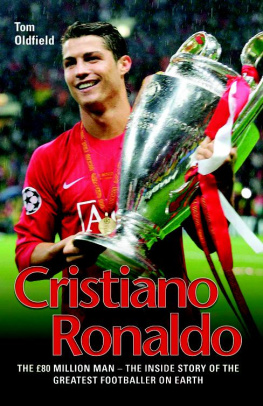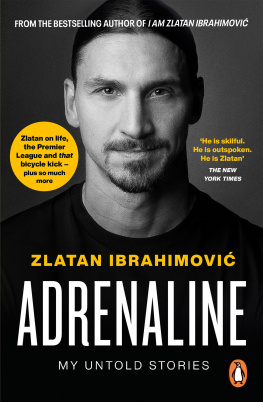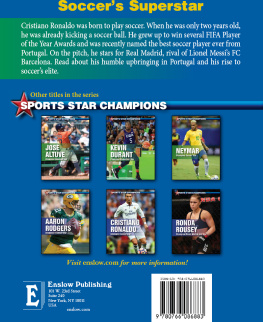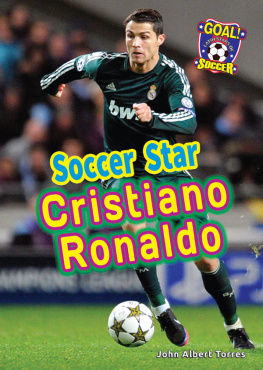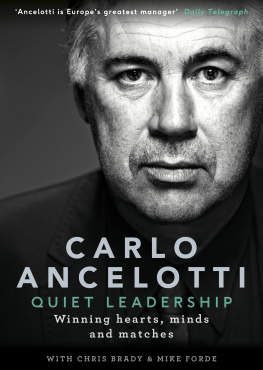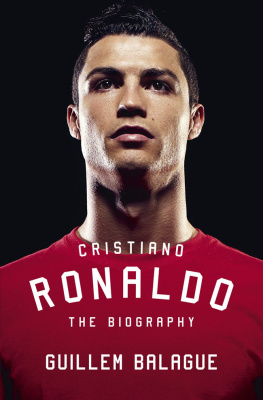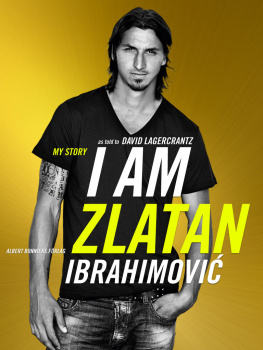Carlo Ancelotti
QUIET LEADERSHIP
Winning hearts, minds and matches
WITH CHRIS BRADY
AND MIKE FORDE
Contents
Giuseppe and Carlo Ancelotti, Stadio Comunale, Turin 1985
Carlo Ancelotti
In loving memory of my first great leader, my father, Giuseppe
Chris Brady
For my wife, Anita, and my favourite daughter,
Eleanor, because I love them both
Mike Forde
To my father who taught me the responsibility that goes with leading others; to my mother who showed me how to create an environment for people to be inspired and comfortable to be themselves and to my wife, Daniela, who unconditionally supports me daily to be the best version of me I can be.
Preface
As a young boy growing up on a farm in the north of Italy, did I ever imagine myself becoming a leader in a multimillion-pound global industry? Of course not. All I wanted to do was play football.
Now, when I look back, I can see that we were poor but happy and my family taught me the beginnings of many of the lessons you will read about over the course of this book. Things like respect and loyalty, the value of money and hard work, the importance of family these seeds were planted early for me, and they grew and flowered when I was privileged to embark on a career first as a professional football player and then as a manager.
Quiet Leadership is a collection of reflections on my time in football and my thoughts and philosophies on what it takes to be a leader in my profession. By extension, these lessons can be taken into other professions; there are similarities between leaders in all fields, be it in football or business, and I am a big believer in importing knowledge from other areas, just as I have exported my own expertise to Paris, London, Madrid and now Munich. We should never cease to learn.
A quiet approach to leadership might sound soft or perhaps even weak to some, but that is not what it means to me, and it is definitely not what it means to anyone who has ever played with me or for me. The kind of quiet I am talking about is a strength. There is power and authority in being calm and measured, in building trust and making decisions coolly, in using influence and persuasion and in being professional in your approach. When you watch Vito Corleone in The Godfather, do you see a weak, quiet man or do you see a calm, powerful man in charge of his situation?
My approach is born of the idea that a leader should not need to rant or rave or rule with an iron fist, but rather that their power should be implicit. It should be crystal clear who is in charge, and their authority must result from respect and trust rather than fear. I believe that I have earned the respect I am shown, partly through a successful career delivering trophies for my clubs, but perhaps more importantly because of the fact that I respect those I work with. These people trust me to do the right thing, just as I trust them with their roles in the organization.
My method of leading is part of who I am it is true to my character and an essential element of my personality. Leadership can be learned but cannot be imitated. It is possible to observe other great leaders at work, but if your natural inclination is to be quiet, calm and take care of others it is unwise to try to be anyone else.
The Quiet Way has been with me from my childhood with my father and in football ever since I became captain of Roma as a player, continuing when I joined Milan, where the players looked to me as one of the leaders in the dressing room, and then throughout my time managing not only that club but also teams including Chelsea, Paris Saint-Germain and Real Madrid. It is the same approach that I am taking with me to Bayern Munich as I begin a new challenge there, and it is the very approach that anyone hiring me knows they are buying into.
When I left Madrid in May 2015, I decided that this would be a perfect time both to sort out a long-standing neck problem that had been restricting me more and more and to take a sabbatical. I was able to spend more time with my wife, Mariann wed married the previous year, shortly after Madrid won the Champions League at our home in Vancouver. Then I waited to see which jobs were vacant for the next season, because I definitely wanted to work again. After playing, it is the best job in the world, to manage a football club, and I have been so lucky to manage the champion teams in some of Europes greatest cities.
I knew that there would be pressure at different stages of my sabbatical for me to start at a new club, whenever other managers in Europe looked to be coming to the end of their own periods in charge. I was linked with Liverpool FC in the media a great honour and I was definitely interested, but not disappointed when I wasnt appointed. Jrgen Klopp is right for them; he will succeed there. My rest away from the game has been good for me too, but when an opportunity as great as the Bayern Munich job comes along, its impossible to refuse. I am planning to have the longest period of sustained success of my career.
What you wont find in this book is a chapter on relationships. This is because relationships form the foundation of everything I do as a leader, so they feature on every page: relationships with those above me, with my support team and, most importantly, with the players.
Without the players there can be no game, just as without people and a product, there is no business. The thousands in the stadiums, the millions watching at home theyre not paying to see me, or Pep Guardiola or Sir Alex Ferguson on the sidelines; they want to see the players, the magic they can conjure up. Working with these athletes, taking care of them and helping them develop and grow, building trust and loyalty, sharing our successes and bouncing back together from disappointment, this is the heart of my job for me. This is why I get up for work every day with a smile on my face.
As children, we first play the game because we fall in love with it. When I started playing professionally, I couldnt believe my luck at being paid to do something I love. Sometimes, somewhere along the way the pressures and difficulties on and off the pitch can cause the passion to fade or die. It is my responsibility to help the players stay in love. If I can succeed in this, then I am happy.
Working on this book, sharing stories and many great memories as well as some difficult ones with my two co-writers and friends, Chris Brady and Mike Forde, has been a very rewarding experience for me. My hope is that you will find something in here to take into your own life and career and perhaps something that makes you happy too.
Carlo Ancelotti
February 2016
Introduction
Chris Brady
This book took several years to pull together, mostly because the three of us Carlo Ancelotti, Mike Forde and I wanted it to be a genuinely collaborative piece of work. We started out by defining what we didnt want the book to become. It wouldnt be a standard autobiography, it wouldnt be aimed primarily at a football audience, it wouldnt be an academic business book and it certainly wouldnt be a kiss-and-tell.


